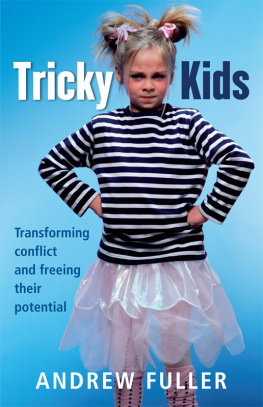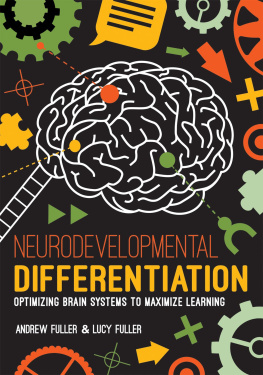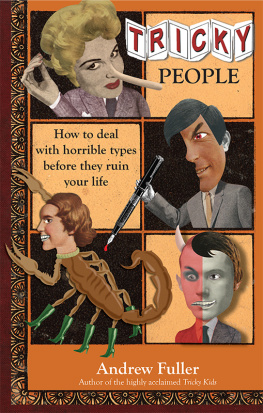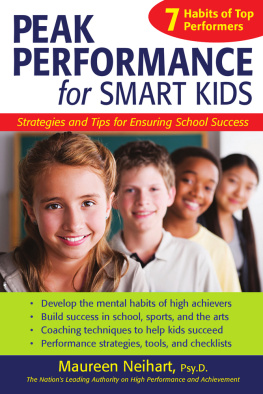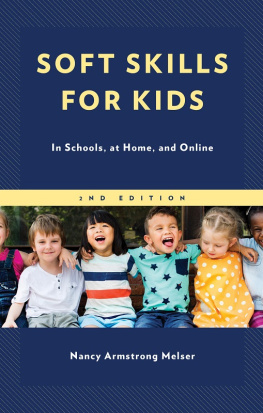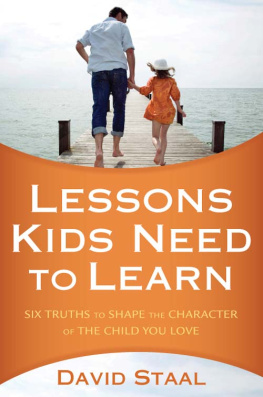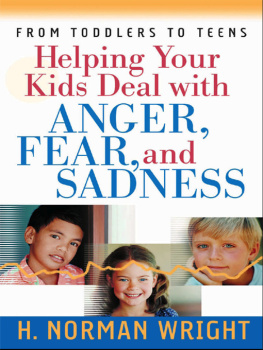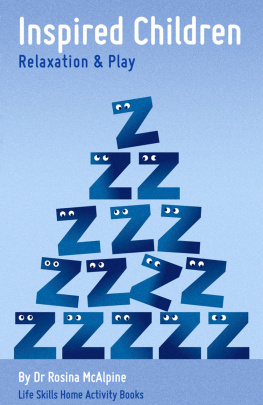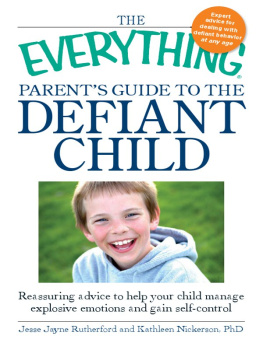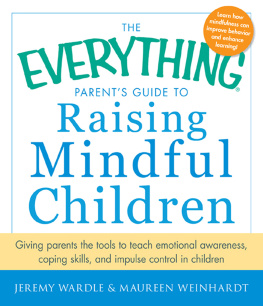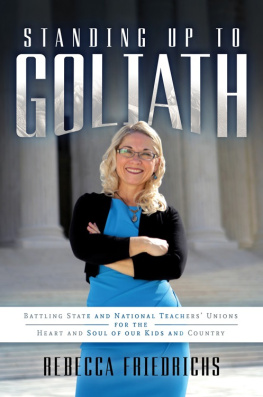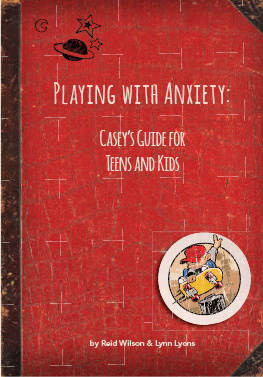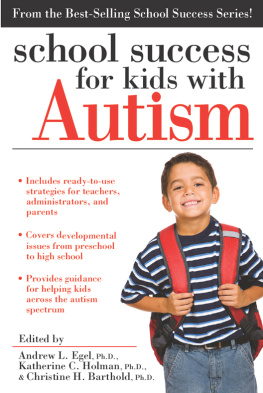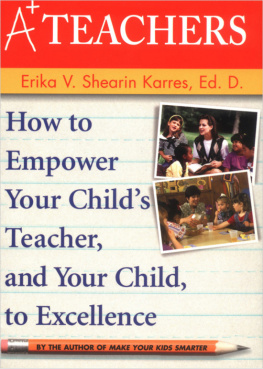. Ten golden ideas for parenting tricky kids
. The Manipulators
. The Negotiators
. The Debaters
. The Competitors
. The Dare Devils
. The Passive Resisters
. Infancy and preschool
. Early to mid-primary school
. Late primary school
. Adolescence
. The chemistry behind their moods
. Eight important mood changers
. Stop what you are doing Step 1
. Build belonging Step 2
. Create a culture of cooperation Step 3
. Start a new dance Step 4
. The dance Step 5
. Thriving in the age of anxiety
. Self-esteem skills
. Self-awareness and awareness of others
. Emotional wellbeing
. When things get stuck
. Violence and depression
. From lying to honesty
. Peer-group pressure
. Perfectionism
. Sexuality
. Survival skills for parents
For Vicki and for all the tricky kids and their parents who taught me how to write this book
Important information While every care has been taken in researching and compiling the information in this book, it is in no way intended to replace professional legal advice and counselling. Readers are encouraged to seek such help as they deem necessary. The authors and publisher specifically disclaim any liability arising from the application of information in this book.
HarperCollins Publishers
First published in Australia and New Zealand in 2007
by Finch Publishing Pty Limited, Warriewood, NSW
This edition published in Australia in 2013
by HarperCollins Publishers Australia Pty Limited
ABN 36 009 913 517
harpercollins.com.au
Copyright 2007 Andrew Fuller
The right of Andrew Fuller to be identified as the author of this work has been asserted by him under the Copyright Amendment (Moral Rights) Act 2000 .
This work is copyright. Apart from any use as permitted under the Copyright Act 1968 , no part may be reproduced, copied, scanned, stored in a retrieval system, recorded, or transmitted, in any form or by any means, without the prior written permission of the publisher.
HarperCollins Publishers
Level 13, 201 Elizabeth Street, Sydney NSW 2000, Australia
31 View Road, Glenfield, Auckland 0627, New Zealand
A 53, Sector 57, Noida, UP, India
7785 Fulham Palace Road, London, W6 8JB, United Kingdom
2 Bloor Street East, 20th floor, Toronto, Ontario M4W 1A8, Canada
10 East 53rd Street, New York NY 10022, USA
National Library of Australia Cataloguing-in-Publication entry
Fuller, Andrew.
Tricky kids: transforming conflict and freeing their potential.
Includes index.
ISBN: 978-1-4607-0123-2.
1. Problem children. 2. Problem children Behaviour modification. 3. Problem children Education. I. Title.
649.153
Cover design by Darian Causby
Cover photograph courtesy of Photolibrary
Illustrations by Adrian Osborne
I have worked with Andrew Fuller across three Australian educational jurisdictions, and I know that his work is held in high regard by many people. Andrew enlightens his audience with this book, which provides practical support to parents and teachers about kids who can present major challenges and, at times, can be difficult to manage.
Tricky Kids provides an insight into the behaviours of these young people, and practical strategies to support them in developing new behaviours while retaining their individual identity. The Teachers Supplement is particularly timely because of the increasing interest in middle years and adolescence. The supplement explores support strategies for these young people in the classroom, and can be used to better help and educate these young people at such a pivotal point in their lives.
Trevor Fletcher
Deputy Director General, Schools, NSW
Andrew Fuller has pulled together his immense counselling experience in Tricky Kids . In his very easy-to-read style, he identifies six different types of tricky kids, and leads parents through a five-step program to turn tricky kids around so they can achieve their true potential.
Throughout the book, Andrew stresses that tricky kids are not bad kids, but rather children who have found that certain behaviours work for them. Their response is to keep using and perfecting these behaviours. The parenting strategies presented encourage these kids to find that other behaviours can also reap rewards. By focusing on the behaviour rather than the child, by developing rituals and sometimes being spontaneous, parents are given strategies to assist them to turn their tricky kids around. Andrew stresses that there are no quick fixes: he encourages parents to work in six-week blocks to work on positive changes in behaviour. He urges parents to become fierce friends to their children and allow them to develop resilience.
Andrew uses language that is parent-friendly, ignoring the jargon that usually litters the psychological and educational worlds.
As an educator, what I particularly like about this book is that Andrew does not just concentrate on the students who are the obvious disruptors in classrooms and in homes. He also importantly identifies the kids who are the least resilient in our schools, the ones I like to call the kids who hide by being good. I am also pleased that Andrew has included a Supplement for the teachers of tricky kids. This reinforces the importance of the partnership between home and school that is imperative if we are to make a difference when dealing with tricky kids.
Tricky Kids would be a welcome addition to the bookshelves of many families and schools. I will certainly be referring to it for years to come.
Lorraine Day
Principal, Carmel School, Perth
Tricky Kids is an amazing insight into the minds of young adolescents, and it is a good read. But more importantly, it is a true reflection of the challenges which face many parents and teachers today. The subject matter provides fascinating thinking about those young adolescents who are difficult to raise and teach. It also poses interesting questions: Why are some young people challenging our ability to raise a generation of resilient and caring youth? And how do we combat the rising trend in depression and low self-esteem?
By answering these questions, Andrew manages to not only calm our fears, but also restore our faith in young adolescents. Andrews life lessons come from observing the actions of parents, teachers and young people over many years and often in crisis programs. Having worked with so many young people, Andrews real strength is to write in an engaging way and a humorous style that is geared to appeal to parents and teachers alike.
The Teachers Supplement is essential reading for all educators. It is an honest representation of the challenges faced by so many teachers in classrooms as they try to ensure that every child reaches their potential.
Tricky Kids has much to add to the debate about our duty of care as teachers, and the important role of adults in the lives of young people. It guides the reader through a huge range of strategies designed to help us all develop coping skills and survive those tricky kids who give us such high anxiety! I would highly recommend it for reading by all adults who care about our future society and the role we must take in developing the next generation of strong leaders who have a good heart and a good spirit.

